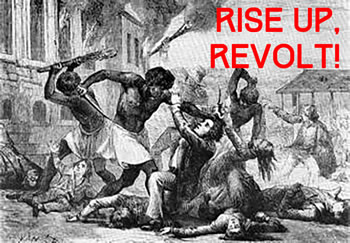Difference between Revolt and Revolution
Key Difference: A revolution seeks to gain powers or rights from an oppressive power, or to gain freedom, whereas a revolt is where the people disagree with something like rules, or laws, and come together to show their disapproval.
 Revolt and Revolution are two commonly confused words, primarily because not only do they sound similar but actually refer to similar things. Both refer to an uprising or unrest among the people which may or may not involve violence. Hence, it is no surprise that revolt and revolution are often mistakenly used interchangeably.
Revolt and Revolution are two commonly confused words, primarily because not only do they sound similar but actually refer to similar things. Both refer to an uprising or unrest among the people which may or may not involve violence. Hence, it is no surprise that revolt and revolution are often mistakenly used interchangeably.
It is true that both revolt and revolution refer to unrest, where people get together and show their dissent of certain things; however the intention behind each of them differs. A revolution seeks to gain powers or rights from an oppressive power, or to gain freedom, whereas a revolt seeks to overthrow and destroy that power, as well as its accompanying laws.
According to Encyclopedia.com, revolutions are primarily utilized to as a “way of changing society by forcing governments to change policy, by resisting the rule of foreign powers, or by wholly overthrowing and replacing governments.” A revolt, on the other hand, is more of a direct approach to getting laws, rules or regulations changed. A revolt is basically an action against authority. It is a way to show that they refuse to be controlled or ruled.
Usually, a revolt is on a smaller scale, or an isolated situation; whereas, a revolution is generally on a much larger scale. It is typically countrywide or regional, where the citizens are trying to overthrow the government or ruling party. A revolt is commonly a one-off instance where the people disagree with something like rules, or laws, and come together to show their disapproval. A revolt is like a protest, but it is more likely to be violent.
A revolt is an anarchy, whereas a revolution is more structured or planned. People in higher places have decided where protests should be aimed and carried out, where they would have more of an impact. A revolt is just people getting together to show their disagreement with power and force.
Think of it this way, when people are in the street breaking things and looting, then it is more likely to be a revolt, whereas in a revolution most of the general public are likely to be sitting home watching the news to see a power struggle within the country.
 Other examples to look at:
Other examples to look at:
Revolt:
- The people revolted against the pay cuts.
- The citizens will revolt against broad cuts in government services
- There was a major anti-tax revolt last year.
Revolution:
- The French Revolution changed France from a monarchy to a republic.
- Tomorrow is the 30th anniversary of the revolution.
- The whole period leading up to the revolution is an interesting chapter in British history.
Comparison between Revolt and Revolution:
|
|
Revolt |
Revolution |
|
Definition (Oxford Dictionaries) |
Take violent action against an established government or ruler; rebel. |
A forcible overthrow of a government or social order, in favor of a new system. |
|
Etymology |
Mid 16th century: from French révolte (noun), révolter (verb), from Italian rivoltare, based on Latin revolvere ‘roll back’ (see revolve). |
Late Middle English: from Old French, or from late Latin revolutio(n-), from revolvere ‘roll back’ (see revolve). |
|
Type |
Verb, Noun |
Noun |
|
Goals |
Short Term Goals |
Long Term Goals |
|
Purpose |
Disagree with rules or laws |
To overthrow the current government or ruling party. For freedom |
|
Planning |
Anarchy, and Chaos |
Usually Planned |
|
Scale |
Smaller |
Larger |
|
Duration |
Shorter |
Typically Longer - can go on for years or decades |
|
Violence |
Can be violent or peaceful. More likely to be violent. |
Can be violent or peaceful |
Reference: Oxford Dictionaries (Revolt, Revolution), Cambridge Dictionary (Revolt, Revolution), Merriam-Webster, Wikipedia (Revolution, Rebellion), Stack Exchange, Encyclopedia Image Courtesy: pushblack.org, aboutmanchester.co.uk









Add new comment